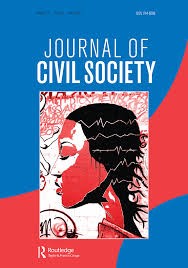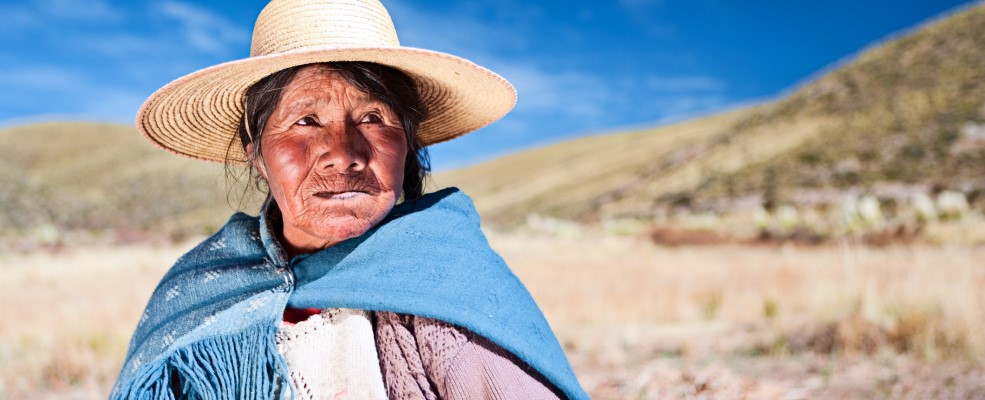Mae'r cynnwys hwn ar gael yn Saesneg yn unig.
A new study by Professor Paul Chaney examines civil society perspectives on the contemporary human rights situation of indigenous people in Bolivia. It is part of research funded by the Academy of Medical Sciences undertaken in partnership with Professor Sarbeswar Sahoo (Indian Institute of Technology, Delhi) and Dr Reenu Punnoose (Indian Institute of Technology, Palakkad).
Bolivia is the first country to incorporate the 2007 United Nations Declaration on the Rights of Indigenous Peoples (UNDRIP) into domestic law. The purpose of the Declaration is to identify standards by which governments can recognise the rights of indigenous peoples.
Despite this pioneering legal move, a raft of authors have suggested that indigenous people (IP) remain subjected to extensive rights violations that may amount to cultural genocide, or the effective destruction of a people by systemically destroying or undermining the integrity of their culture and system of values. In definitional terms, many indigenous people are the descendants of populations living in the region at the time of colonisation. This new WISERD study follows the former Special Rapporteur on Indigenous People, Martínez Cobo (and UNDRIP Article 8), in noting the principal diagnostic for indigeneity is self-identification.
The new research examines whether there is empirical evidence in civil society organisations (CSO) submissions to the latest Universal Periodic Review (UPR) (a five-yearly human rights compliance exercise undertaken by the United Nations) to support earlier academic work claiming IP in Bolivia face cultural genocide.
The central argument of the analysis is that, against the backdrop of evolving rights and governance reforms, UPR data show how indigenous people are subject to discrimination, denial of land rights, exclusion from decision-making, violence and suppression of indigenous languages. For example, discrimination against indigenous people/ rights denial breaches UNDRIP Articles 1 ,2, 8, 9, and 15, yet as this CSO observed, ‘There is systematic political discrimination against indigenous leaders who defend their rights, who are publicly attacked and, in some cases, prosecuted’.
Earlier work shows how the poverty gap between indigenous and non-indigenous people is increasing. This links to UNDRIP Article 17 and 21 violations (inter alia, ‘Indigenous individuals have the right not to be subjected to any discriminatory conditions of labour and, employment or salary’). As this CSO submission to the UPR complained, ‘Despite the national government’s efforts to improve the treatment of indigenous persons, these populations still face disproportionate rates of poverty and unemployment’.
A further key problem highlighted by the civil society discourse is legal inconsistency between UNDRIP, domestic law, and earlier UN resolutions on ownership of natural resources. In particular, current mining law limits free, prior, and informed consent on projects that affect indigenous peoples’ rights to land and resources. For example, this submission noted tersely, ‘Further progress on the participation and consultation of indigenous peoples, in particular with regard to mining… [has] Not been implemented’.
The CSO discourse also highlights numerous examples of violence and harassment. For example, this CSO complained: ‘Human rights defenders who engage on environmental issues have been subjected to intimidation, threats, surveillance, and criminalisation… a judge declared the indigenous communities’ popular action against the Rositas Hydroelectric Project inadmissible […] it will flood approximately 45,000 hectares of land, leaving the territory of twelve Guaraní communities (approximately 500 families) under water’.
The CSO discourse also describes vividly the different dimensions of indigenous language rights violations (UNDRIP Articles 13, 14, 15, 16). One explained that ‘there is no State funding to implement the policies of vitalization and revitalization of indigenous languages. There are no resources to implement the regionalized [schools] curriculum and there is not enough trained personnel to carry out Law No. 071/10 of Education [a commitment to education in Indigenous languages]’. Major shortcomings also exist in higher education. As one CSO complained, ‘The State must… allocate greater resources for intracultural and intercultural education policies’. A further aspect of the malaise relates to public services. Thus, for example, this CSO complained, ‘Medical care is not carried out in the language of indigenous people or according to their culture and without a gender perspective’.
This new study explains how the human rights violations faced by indigenous people stem from inadequate monitoring and enforcement of the law, power disparities in governance structures that privilege central government at the expense of indigenous communities, and fundamental conflicts between indigenous interests and neo-liberal capitalism and extractive industries.
It proceeds to argue that whilst this currently falls short of cultural genocide, the present constitutes a critical juncture. Unless there is urgent action by government and other parties, over coming years the ongoing and cumulative effect of these negative forces is likely to lead to the cultural genocide of some of the more vulnerable indigenous groups in the plurinational Bolivian state.
The findings of this study will be published shortly:
 Chaney, P. (2025 forthcoming) Cultural Genocide? Civil Society Perspectives on the Contemporary Human Rights Situation of Indigenous People in Bolivia: A Critical Analysis, Journal of Civil Society, Routledge T&F.
Chaney, P. (2025 forthcoming) Cultural Genocide? Civil Society Perspectives on the Contemporary Human Rights Situation of Indigenous People in Bolivia: A Critical Analysis, Journal of Civil Society, Routledge T&F.

